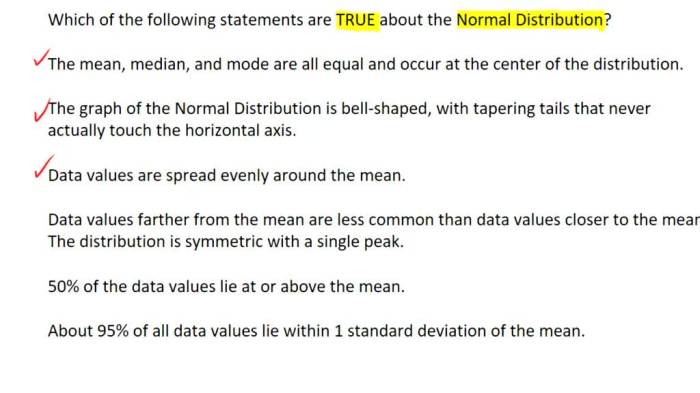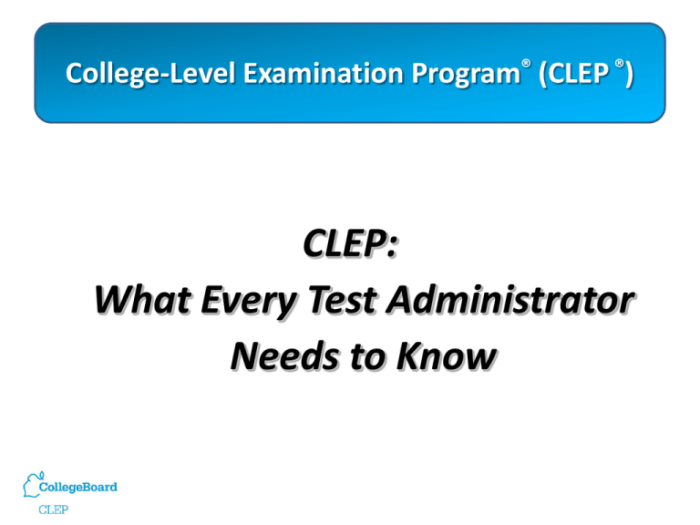Which of the following is true about CLEP? This guide delves into the intricacies of the College Level Examination Program (CLEP), exploring its benefits, structure, preparation strategies, and utilization for college credit.
CLEP offers a unique opportunity for individuals to demonstrate their knowledge and earn college credit without the traditional classroom experience. By understanding the various aspects of CLEP, students can optimize their academic journey and achieve their educational goals.
1. What is CLEP?

CLEP (College Level Examination Program) is a standardized testing program that allows students to earn college credit by demonstrating their knowledge and skills in various academic subjects. Unlike traditional college courses, CLEP exams are administered by the College Board and can be taken at any time, regardless of the student’s enrollment status.
CLEP exams differ from traditional college courses in several ways. First, they are not tied to a specific semester or academic calendar. Second, they are typically shorter and less expensive than traditional college courses. Third, they are not graded on a traditional letter scale, but rather on a pass/fail basis.
2. Benefits of CLEP Exams
There are several advantages to taking CLEP exams, including:
- Save time:CLEP exams can allow students to earn college credit more quickly than by taking traditional college courses.
- Save money:CLEP exams are typically less expensive than traditional college courses.
- Improve academic standing:CLEP exams can help students improve their academic standing by earning credit for courses that they may not have otherwise taken.
- Explore new subjects:CLEP exams can allow students to explore new subjects without having to commit to a full-semester course.
3. CLEP Exam Format and Structure

There are two types of CLEP exams: general exams and subject exams.
General examscover broad areas of knowledge, such as math, science, and humanities. Subject examscover specific subjects, such as English literature, history, and psychology.
CLEP exams are typically multiple-choice tests, but some exams also include essay questions. The length of CLEP exams varies depending on the subject, but most exams are between 90 and 120 minutes long.
CLEP exams are scored on a pass/fail basis. A passing score is typically between 50% and 60%. Students who pass a CLEP exam will receive college credit for the corresponding course.
4. Preparing for CLEP Exams: Which Of The Following Is True About Clep
There are several ways to prepare for CLEP exams, including:
- Study materials:There are a variety of study materials available for CLEP exams, including textbooks, online courses, and practice tests.
- Practice tests:Practice tests can help students identify areas where they need additional study.
- Time management:CLEP exams are timed, so it is important to practice managing your time effectively.
- Exam-taking skills:There are a number of exam-taking skills that can help students improve their performance on CLEP exams.
5. Using CLEP Scores for College Credit

CLEP scores can be used to earn college credit at most colleges and universities. The amount of credit that a student receives for a CLEP score will vary depending on the college or university and the specific CLEP exam that was taken.
To use CLEP scores for college credit, students must first submit their scores to the college or university that they are attending. The college or university will then determine how many credits the student will receive for their CLEP scores.
There are some limitations and restrictions on CLEP credit acceptance. For example, some colleges and universities may not accept CLEP credit for certain courses. Additionally, some colleges and universities may have a limit on the number of CLEP credits that a student can use.
Questions and Answers
What is the purpose of CLEP?
CLEP allows students to earn college credit by demonstrating their knowledge through standardized exams.
How does CLEP differ from traditional college courses?
CLEP exams are self-paced and do not require enrollment in a specific course or institution.
What are the benefits of taking CLEP exams?
CLEP can save students time and money, accelerate their degree completion, and provide opportunities for advanced placement.
How do I prepare for CLEP exams?
Effective preparation involves utilizing study materials, taking practice tests, and developing strong time management skills.
How can I use CLEP scores for college credit?
CLEP scores can be submitted to colleges and universities for credit evaluation, subject to their specific policies.

